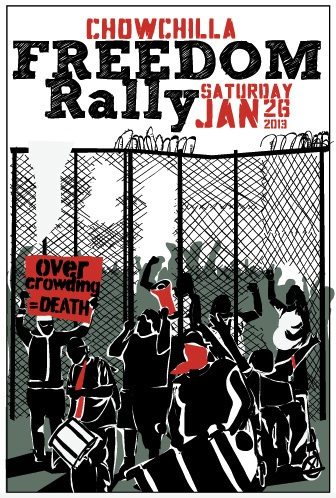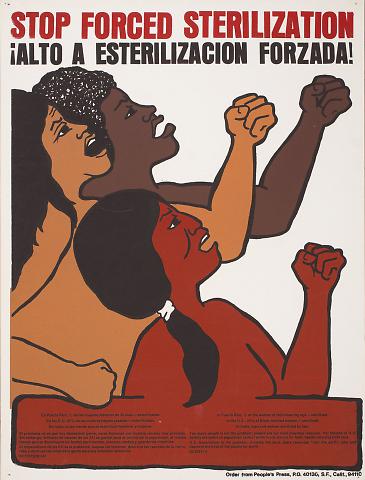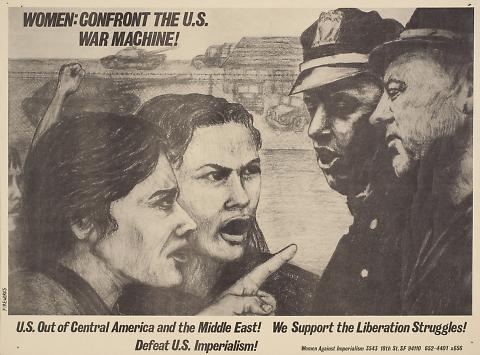Gender and Sexuality
This collection features materials from a number of sources focusing on struggles revolving around gender and sexuality. These struggles are not separate from larger struggles for liberation but specifically incorporate unique voices and perspectives.
Subcollections
-
Connexions
Connexions is the collective product of feminists of diverse nationalities and political perspectives committed to contributing to an international women\'s movement. -
Feminist and Lesbian Politics: Monographs-Periodicals-Articles
This collection contains materials focusing on radical feminist and lesbian politics. While diverse in medium and subject matter, this collection contextualizes women’s liberation highlighting issues of class, race, sexuality and imperialism. -
Materials shot and collected in the making of The Forest for the Trees
Raw materials from the documentary "The Forest for the Trees" which details the amazing story of the fight to clear Earth First! activist Judi Bari's name after her car was bombed and she was arrested as a terrorist. -
Out of Control: Lesbian Committee to Support Women Prisoners
Out of Control (OOC) was a self-supporting committee formed in 1987 to organize resistance to the Lexington Control Unit for women. -
Prisons - Women
This collection contains materials relating to the specific conditions, challenges and struggles facing women in prison. Topics are varied but materials include conference papers, informational materials, legal perspectives and audio recordings. -
Programs produced by Judy Gerber and Laurie Simms
This collection contains grassroots radio programming produced by Judy Gerber and Laurie Simms. This programming primarily occurred during the 1980s and 1990s. -
Sterilization
This collection contains materials focusing on the sterilization of women and efforts to resist this practice. -
Violence Against Women
This collection contains materials focusing on violence against women. Specific topics covered include women who fight back against their abusers, rape, pornography, sexism and self-defense. -
Women Against Imperialism
Women Against Imperialism was a grassroots, feminist, anti-imperialist solidarity organization formed in San Francisco in 1981. Women Against Imperialism’s work primarily consisted of direct action organizing and political education activities.
Documents
7 Documents Found
Date: 9/9/1989Call Number: JG/ 003Format: CassetteProducers: Judy GerberCollection: Programs produced by Judy Gerber and Laurie Simms
ACLA show, Just Peace Today Program, Bill Crossman from the Free PR committee on upcoming US government referendum on PR's status.
Date: 9/8/1989Call Number: JG/ 036AFormat: Cass AProducers: Judy GerberCollection: Programs produced by Judy Gerber and Laurie Simms
Guadalupe Gonzales from the FMLN/ FDR speaks on the 9/7/'89 announcement that the FMLN wants to sit down with ARENA Pres. Cristiani for peace negotiations. Judy Gerber reads a NACLA interview w/ ARENA Colonel Juan Zapata, Zapata in ARENA's vice minister of defense, he defines the FMLN as terrorists.
Call Number: JG/ 080BFormat: Cass BProducers: Judy GerberCollection: Programs produced by Judy Gerber and Laurie Simms
Bonpane discusses many topics of the day (recorded October 1990). 1. Sen. Pete Wilson refuses to see him and representatives of Salvadorian community regarding House Resolution #5114 and the Casden-Graham provision. 2. Brian Wilson, who lost his legs trying to stop a munitions shipment to El Salvador, informs of a peace delegation underway to Iraq. 3. Bonpane reads open letter from Mennonites to the people of Iraq. 4. Responds to Democratic National Committee Chair Ron Brown's statement regarding Democratic support for war in Iraq. 5. Informs of 10-day Human Rights delegation to Mexico. 6. Informs of Reverend Father Ernesto Cardenal Martínez's upcoming visit to Los Angeles. 7. Bonpane reads a letter from Jeffrey Patterson who refused to serve in the military action in Iraq.
Call Number: JG/ 081BFormat: Cass BProducers: Judy GerberCollection: Programs produced by Judy Gerber and Laurie Simms
Michael Job who served as the Chair of the Veteran's Peace Action Teams and is a Vietnam combat veteran discusses reason behind military action in Iraq. Job and Bonpane discuss the conflicting and confusing multitude of reasons for war with Iraq given by President George Bush (Sr.). They discuss the contradictions and hypocrisy in Bush's arguments, call for more critical thinking by citizens and military personnel. Discuss the similarities between a draft and indentured servitude (slavery), the class issues involved in the war, and the exploitation of the poor by military recruiters. They put the military buildup in the Middle East in perspective by linking it to Regan's Iran Contra affair and attacks on Nicaragua. Call for equality in treatment of countries - foreign military response to US invasion of Panama and Israeli invasion of Syria. They reject double standards and liken Bush's action to starting a global conflict.
Date: 1/1/1992Call Number: JG/ 090Format: CassetteProducers: Judy GerberProgram: A Defiant HeartCollection: Programs produced by Judy Gerber and Laurie Simms
Interview with Gladis Sibrion, representative of the FMLN, regarding the New Year’s peace settlement between the FMLN and government of El Salvador. Sibrion sees the settlement as a victory for all Salvadorans because it represents the defeat of military control over civilian life. She outlines the major points of the settlement presented by the FMLN: cleansing of the military, establishing a new civilian police including FMLN representatives, dismantling civilian defense forces, reforming the judicial system, and establishing human rights oversight. Sibrion believes that while the U.S. wants to end the Salvadoran conflict, it also wants to retain a strong presence, which she believes requires a weakening of the FMLN. She notes mixed popular reaction to the settlement by the Salvadoran people - both of optimism and skepticism.
Publisher: Peoples Translation ServicesYear: 1991Volume Number: No. 36Format: PeriodicalCollection: Connexions
Focuses on the idea that war is a function and fulfillment of patriarchy and a male experence while highlighting the ways in which women work towards peace.
Publisher: The RallyerYear: 1991Volume Number: No. 1 MarchFormat: PeriodicalCollection: Feminist and Lesbian Politics: Monographs-Periodicals-Articles
Inside this Issue: Ongoing Peace Activities; Daily Political Events Calendar; Utah Pro-Choice; California Nuclear Waste Dump Planned; Redwoods Logging Moratorium; more.
7 Documents Found









